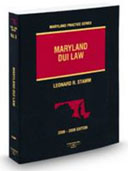Maryland jurisdictions have slowly been replacing their 10 year old breathalyzers – affectionately called “breathaliars” by some – Intox EC/IR with the new breathalyzers – the Intox EC/IR II. This machine, manufactured by Intoximeters, Inc. in St. Louis, Mo. has a few improvements over its predecessor, according to the manufacturer.
In a letter dated July 6, 2006, M.R. Forrester, Chairman of Intoximeters, Inc., wrote the following about the newer EC/IR II:
One of the main reasons the EC/IR II was developed was certain parts of the EC/IR I were becoming obsolete, which made them harder to find and more expensive to replace. The primary difference concerns the Microprocessor on the motherboard and the case set. The analytical module in the EC/IR II is very similar to the one used in the EC/IR I in that we are using the same Fuel Cell sensor and sampling system. The microprocessor change is necessary because the EC/IR I microprocessor has been made obsolete since it is a state of the art device, which works at a far higher processor speed.
As often occurs with technological advances, the shortcomings of old technology are highlighted by the developments of new technology. For example, the higher flow of the new purge fan “is capable of opening [a] stuck mouthpiece.” The implication here is that the mouthpiece on occasion can get stuck, resulting in the machine recording insuficient breath. Additionally, the case set notes that there is higher “R[adio][]F[requency] immunity.” Although there is a claim that “RF immunity is adequate” in the EC/IR I, the need for higher RF immunity in the EC/IR II suggests otherwise. Other improvements made in the EC/IR II with serial numbers over 10,000 include modifications incorporating “additional test memory capacity, additional hardware to allow recirculation of a wet bath simulator, and enhanced EMC and RFI immunity.”
Another issue that comes up with respect to the EC/IR is the lack of availability of training to third parties such as defense experts and lawyers. Intoximeters, Inc. is extremely stingy in making the EC/IR available for purchase and testing to potential adversaries in court, and to date, only a handful of defense experts and lawyers have been allowed to purchase and train on the EC/IR. Even when defense lawyers and experts have been allowed to purchase and train on an EC/IR it is not likely to be on an EC/IR with the same software and set up as the one sold the states for use in criminal prosecution. Rather, the few lawyers and experts allowed to purchase and train on EC/IRs have been able to access EC/IRs that are distributed to employers for testing at the workplace, known as DOT or Department of Transportation machines. These two facts, the prohibition of purchase and training, to most defense lawyers and experts, and the restriction to DOT setup EC/IRs for the few who have been able to purchase and train on the EC/IR, allows state experts to claim that their knowledge of the device is superior to any defense expert. The prohibitions and restrictions on training raise serious due process concerns.
In State v. Chun, the New Jersey Supreme Court held that such training must be made available to defense lawyers and experts. The court said:
The Special Master also recommended that the State provide Alcotest training for defense attorneys and their experts similar to that provided for operators and coordinators. The State, understandably, objected to this recommendation and urges us to reject it. Although we reject it in part, defense attorneys should not be left without any means of learning about the device or its operation. Rather, we deem it to be in the interests of justice that some form of training be made available to defense attorneys to enable them to better prepare to represent their clients. However, we agree that the State should not be burdened with this responsibility. We therefore direct that Draeger make Alcotest training, substantially similar to that provided to Alcotest operators and coordinators, available to licensed New Jersey attorneys and their designated experts. The training shall be offered at regular intervals and at locations within the State of New Jersey, at a reasonable cost to those who attend.
State v. Chun, 194 N.J. 54, 943 A.2d 114 (2008), cert. denied, 129 S. Ct.
158, 172 L. Ed. 2d 41 (2008).
The Supreme Court, in California v. Trombetta, stated that a defendant in a criminal case must have a fair opportunity to challenge scientific evidence offered against him by the State. In order for a defendant to truly be able to examine, interpret, and contest the evidence offered by the State, courts must liberally allow discovery and enforce subpoenas directed at providing equal access to the information used by prosecutors and police.
In related news, the District of Columbia introduced the EC/IR II but developed problems which necessitated removing the units from service and which were detailed in a report by the acting D.C. toxicologist.
If you are facing serious traffic charges in Maryland state or federal court, call Leonard R. Stamm or Johanna Leshner of Goldstein & Stamm, P.A. at 301-345-0122 for a free consultation.
Leonard R. Stamm Goldstein & Stamm, P.A.
6301 Ivy Lane, Suite 504 Greenbelt, Maryland 20770 www.lstamm.com
301-345-0122 (fax) 301-441-4652
Author: West’s Maryland DUI Law

 Maryland DUI Lawyer Blog
Maryland DUI Lawyer Blog

